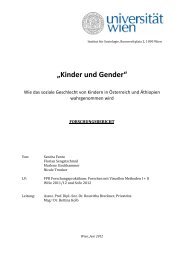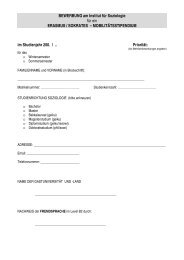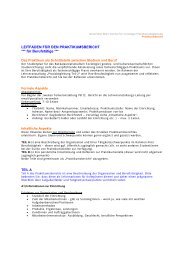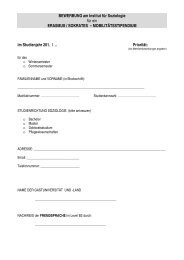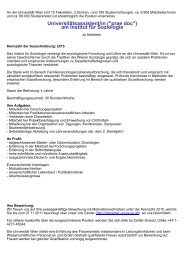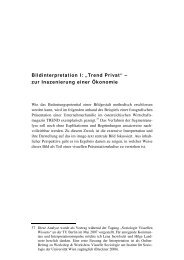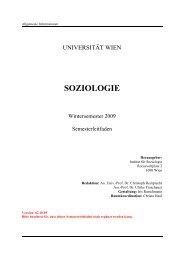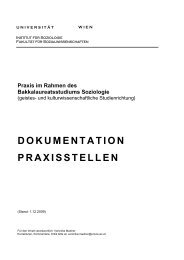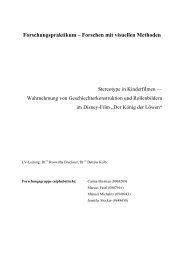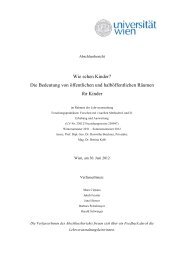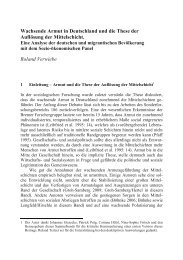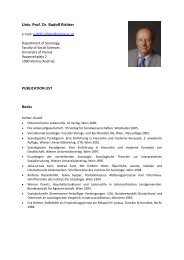Why do Europeans Migrate to Berlin? SocialStructural Differences ...
Why do Europeans Migrate to Berlin? SocialStructural Differences ...
Why do Europeans Migrate to Berlin? SocialStructural Differences ...
You also want an ePaper? Increase the reach of your titles
YUMPU automatically turns print PDFs into web optimized ePapers that Google loves.
4 Verwiebe<br />
Through the influence of migration researchers like De Jong and<br />
Fawcett (1981), Kalter (1997) or Esser (2004) and their ideas on the<br />
‘‘subjective expected utility’’ of migration, it has become established<br />
practice <strong>to</strong> assume that objective, economic imbalances in the labour<br />
market will be reflected differently from one individual <strong>to</strong> another –<br />
which makes social-structural differences in the formation of reasons for<br />
migration a central point of interest (Plane, 1993). One might expect <strong>to</strong><br />
find substantial differences in the reasons for migration relating <strong>to</strong> gender,<br />
age, education, time of migration and social origin, which opens up<br />
a number of areas for research. In classical economic explanations, for<br />
example, the main migration ac<strong>to</strong>rs are men who are seeking employment<br />
abroad (e.g., Lee, 1966: 50), whereas women tend <strong>to</strong> accompany<br />
their migrating husbands and ⁄ or fathers. If one applies these assumptions<br />
<strong>to</strong> the migration of European women <strong>to</strong> <strong>Berlin</strong>, it could well be<br />
that women’s reasons for migrating are driven less by career interests or<br />
the search for a job which remains <strong>to</strong> be examined empirically, if one<br />
considers more recent studies on the migration patterns of women (compare<br />
for example, Curran et al., 2006; González-Ferrer, 2006; Kofman<br />
et al., 2000; Mahler and Pessar, 2006; Pedraza, 1991; Raghuran, 2008).<br />
With regard <strong>to</strong> the influence of education on the formation of reasons<br />
for migrating, it might be assumed that less qualified as well as highly<br />
qualified <strong>Europeans</strong> (classical labour, elite migration) have particularly<br />
pronounced economic motives for migration (Beavers<strong>to</strong>ck, 2005; Castles,<br />
1986; Findlay et al., 1996; Johnson, 1980; Peixo<strong>to</strong>, 2001; Salt, 1993). In<br />
that context, some authors argue that the migration of highly qualified<br />
people has <strong>to</strong> been seen increasingly against the background of European<br />
integration. Favell (2008) for example, has focused in his recent<br />
work on highly skilled European migrants (mainly in services, IT, banking<br />
and media) in ‘‘Eurocities’’ such as Brussels, Amsterdam, Paris and<br />
Lon<strong>do</strong>n, which benefit from specific European structures of opportunity.<br />
King argues in a similar way: ‘‘The movement of skilled persons lies at<br />
the heart of the attempts <strong>to</strong> integrate Europe through the free movement<br />
of people, goods, services and capital within the EU’’ (King, 2002: 98).<br />
An important complement <strong>to</strong> economic approaches is provided by concepts<br />
that underscore the significance of social fac<strong>to</strong>rs – above all, the<br />
function of social networks and the importance of family-related migration<br />
– in the formation of reasons for migration (Braun and Recchi,<br />
2008; Haug, 2005; Johns<strong>to</strong>n et al., 2006; Palloni et al., 2001; Pries,<br />
2001). These studies have had an impact on the way reasons for migration<br />
have been re-theorised over the last decade. For Pries (2001), for<br />
example, it is not economic fac<strong>to</strong>rs such as wage differences that are<br />
Ó 2011 The Author<br />
International Migration Ó 2011 IOM



